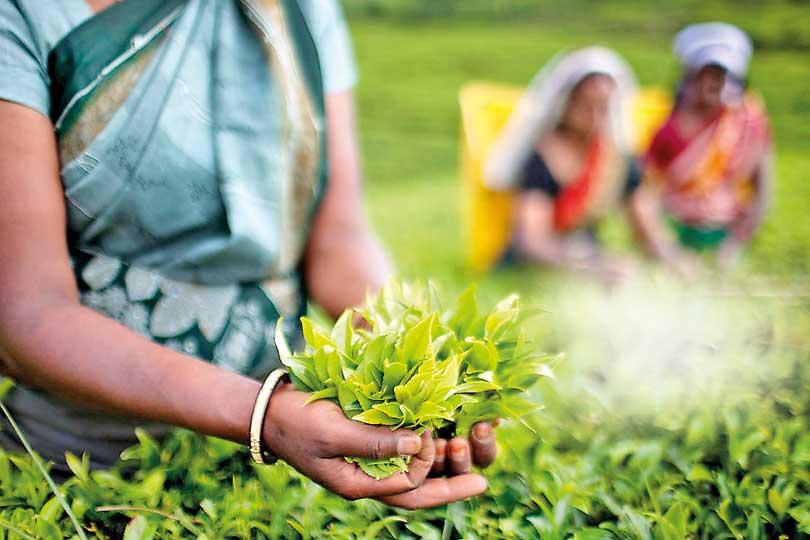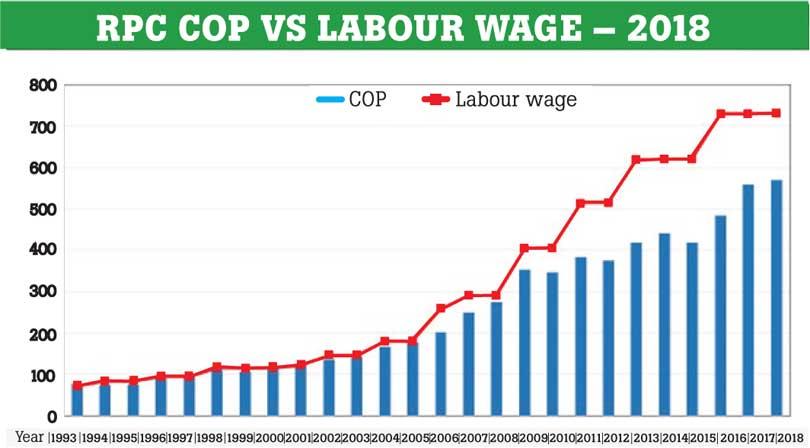05 Mar 2020 - {{hitsCtrl.values.hits}}

The Planters’ Association of Ceylon (PA) wishes to draw the public’s attention to the article by Mr. P.K. Balachandran, in his ‘Colombo Diary’ column in the Daily Mirror of February 4, 2020, headlined, “Who Took Tea Plantations to the Brink of Collapse”, wherein serious allegations, factual misrepresentations and blatant inaccuracies have been levelled against the Regional Plantation Companies (RPC’s). Balachandran has freely referred to quotes by former Trade Unionist R Yogarajan, the business sense of which is completely out of sync and context:-
At the outset, the author falsely claims that the current crisis in the Sri Lankan tea industry is solely attributable to a “failure to replant periodically” and has nothing to do with the exponential increase in wages which only commenced after privatization.
Following one provably false claim with another, he then states that the Rs.1,000 wage has “been approved by Cabinet”. The PA is emphatic that the Rs.1,000 daily wage for estate labour, proposed by His Excellency, President Gotabaya Rajapaksa is still in discussion and a consensus is yet to be reached.
The Association also continues to stand by its initial warning that a daily wage of Rs.1,000 without any commensurate link to productivity will definitely see the collapse of the industry. Such a collapse would have severe implications for the livelihood of approximately 135,000 workers and their families who depend on estate employment, plus the wider almost one million population who reside on the estates and live off them. Perhaps Yogarajan needs to have more empathy towards his constituents rather than bashing the companies that have been providing a source of income to their employees.
First let’s correct the misconceptions and false information that has been published on replanting. RPC’s to end 2017 have replanted a total number of 22,428 hectares of tea, and 70,944 hectares of rubber. These facts get to the heart of the most glaring falsehood contained in the article; the untruthful assertion that tea smallholders have replanted at higher rates than RPCs.
In truth, RPC rates of replanting have far exceeded those of tea smallholders – despite the State having provided generous subsidies to smallholders specifically for this reason. Meanwhile, RPCs have not received a single Government subsidy for replanting, but still continue to invest in replanting at higher rates than smallholders, and the two state-owned plantation companies. The author and his source’s absurd and provably false claims to the contrary stand as a clear indication of their ulterior motives.

Moreover, these claims ignore a simple fact; no amount of replanting or increase in yield can incentivize the harvester to pluck beyond the norm that has been laid down. Academically he pronounces lack of replanting as being at fault, while directing harvesters to stick to a plucking norm, which is the very reason that year on year has hiked up Cost of Production (COP), which now stands at Rs.631. In stark contrast, the Colombo Tea Auction price has tumbled down to Rs.544.54 per kilo as at end December 2019.
Given that the sale price of tea is already substantially lower than the cost of production, the author’s failure to explain how such a fundamental obstacle would be removed by increasing the COP through a further wage hike stands as further evidence of their willful ignorance on even the most basic dynamics of the tea sector.
The Association also continues to stand by its initial warning that a daily wage of Rs.1,000 without any commensurate link to productivity will definitely see the collapse of the industry
The author claims that: “workers are always willing to bring in the crop. They do not leave any tender leaf un-plucked.” He further claims that: “research has repeatedly demonstrated that when the task is mechanical and purely physical, performance-related pay works. However, once even rudimentary cognitive skills are required, it does not work and actually leads to frustration and poor performance. Tea plucking is not entirely mechanical. It requires cognitive skills,”
The best rebuttal to the author’s research and provably false claims on this subject can be found in the important and pioneering work done by Hayleys Plantations with its recently concluded Best Tea Plucker competition. During the event, the winner plucked 9.7 kg of tea within just 30 mins. Winners were given cash prizes and trips overseas as incentives to put their best foot forward and they did, exceeding the daily estate norms of not only RPC estates, but even smallholder estates in the equivalent of just one hour.
Indeed, even on smallholder estates, the reason for higher levels of productivity is precisely due to the revenue-share model being implemented on those estates. The author riddles his own argument with contradictions when he advocates for increasing incentives while claiming that pay-based incentives will not be effective, and then in a remarkably abrupt about-face: advocating for pay-based incentives – namely the revenue share model.
It is therefore clearly necessary - but highly unlikely - that Yogarajan re-evaluate the relevance of his research citations to the plantation industry given the ample evidence to refute it provided by the PA, and himself. Perhaps he should also re-evaluate his own incentive structures in the process, as they do not appear conducive to cognitive work.
RPCs have time and again, consistently shown that an increase of even 2 kgs per day, per harvester, beyond the set plucking norm, could bring down the COP significantly. It is the high COP in Sri Lanka - higher than any other tea growing Country - that will be the downfall of the tea industry, which Trade Unionists such as Yogarajan must be accountable for, despite their ill-informed protestations to the contrary.
Sri Lanka home to the highest paid tea harvesters in world
We wish to remind readers that Sri Lanka continues to pay the highest daily wage rate to its tea harvesters even in terms of US Dollar value at USD 4.72 per day whereas even today, other tea economies are paying closer to USD 2.5 per day. However, Sri Lanka tea harvester output is only 18 kilos per day compared to the more than 30 kilos output per day in all other economies. Another factor conveniently overlooked by the author and his Trade Unionist sources.
Also overlooked is the fact that RPC plantation workers get fully secured, guaranteed lifetime family employment with a mandatory 300 days’ work per year from 18 to 60 years until they retire. The RPC workers are also paid EPF, ETF, Gratuity, 17 days paid holidays per year, attendance bonus, profit bonus, profit share, maternity benefits, 3 months fully paid maternity leave, free maternal and child care on the estate itself from conception to 5 years, free issue of medicines, drugs, vaccinations and vitamins, total Custodial Child Care on estate from 3 months to 5 years, all vaccinations from birth up to 5 years for children on the estate itself with paid leave granted for mothers. This is a system of benefits which is unique to Sri Lanka alone, yet is totally absent of consideration in the article.
All the while RPC’s are being squeezed dry with mounting COP, falling auction prices plus the capital costs needed for tea replanting, which amounts to almost Rs. 4 million per hectare; leaving aside other catastrophic policy interventions carried out in the past such as the previous regime’s flirtation with bans on glyphosate and oil palm cultivation.
It must be reminded that although the RPCs care for a resident population close to 1 million people, only around 135,000 workers actually contribute their labour to the estates meaning that the RPCs have to provide facilities and care for 6 additional non-working souls for every worker.
Productivity linked wages the only way forward
Despite the criticisms which we have levelled against Yogarajan, the PA nevertheless extends its gratitude to him for at least acceding to the fact that a productivity-linked wage is vital for the sustenance of the plantation sector.
This is in fact a position which the PA and its membership have consistently reiterated, as noted by the author himself, when he cites Mahendra Amarasuriya’s address to our own membership, most of whom were in full or at least partial agreement – nearly a decade prior - that a shift away from of the extremely out-of-date daily wage model was the only way to sustain the industry.
Despite the criticisms which we have levelled against Yogarajan, the PA nevertheless extends its gratitude to him for at least acceding to the fact that a productivity-linked wage is vital for the sustenance of the plantation sector
We would urge Yogarajan to educate himself and his former colleagues in the Estate sector Trade Unions of these same facts, given that they remain the biggest obstacle to the reform which he has inadvertently joined us in supporting.
In his statements, he mentions giving workers unutilized land, where workers supply only the tea leaves to the Company which has allotted the land on a contract as ownership of the land lies ultimately with the government. This is already being done on some estates with great results. However, here again, it’s the trade unions that have systematically resisted and stalled progress, probably fearing that workers as cultivators and entrepreneurs would loosen links with the trade unions in the process.
27 Apr 2024 1 hours ago
27 Apr 2024 2 hours ago
27 Apr 2024 3 hours ago
27 Apr 2024 3 hours ago
27 Apr 2024 4 hours ago